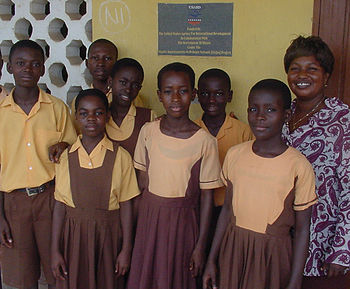Catholic Church will never condone divorce, same-sex unions, or polygamy: Ghana bishops
 |
| English: Headmistress and primary school students in Ghana (Photo credit: Wikipedia) |
Following the conclusion of the Synod on the Family in Rome, the Catholic bishops of Ghana met at their plenary assembly this month to continue to consider the challenges faced by Ghanaian families, and to reaffirm the Church's teaching on marriage and family life.
The theme of this year's plenary was “The Pastoral Challenges of the Family in the Context of Evangelization.”
"The African cherishes the family as the fundamental base of humanity and of society," the bishops observed. "As a family, respect, sense of belonging and care for one another are our values."
The plenary, they said, focused on concerns that today the family is undergoing "significant challenges that rock the very foundation on which God has set the human society."
The bishops affirmed that the Church’s perennial and unchanging teaching on the family "is based on the nature of man but especially on Scripture and Sacred Tradition, namely, that God ordained marriage to be between man and woman when 'God made them male and female and blessed them'."
"God also intended marriage to be open to life when 'He blessed them and said increase and multiply'. Furthermore, God determined marriage to be indissoluble as Jesus affirmed, 'What therefore God has put together, let no man put asunder'," the bishops stated.
They emphasized that "God the Creator, by forming the first man and woman and commanding them to be fruitful and to multiply definitively established the family to be a permanent union between one man and one woman.
"Consequently, the family becomes the sanctuary where life is born, nurtured and welcomed as a gift of God. By matrimonial covenant which the Lord Jesus raised to the dignity of a sacrament, a man and a woman come together to establish between themselves a relationship of love which by its very nature is ordered towards the good of the spouses and the procreation and education of offspring."
In discussing the urgent need for continued evangelization to help Ghanaian families, the bishops again affirmed that evangelization first takes place in the family, as parents “by word and example, are the first heralds of the faith with regard to their children” (Lumen Gentium 11).
"It is in the family that children first learn about God, love of neighbor and the Church. As such, parents are indispensable in sharing the faith with their children. Parents are to assist children to make the appropriate choices at the different stages of their lives," the bishops said.
However, the bishops precisely identified the challenges that have led to the current crises and breakdown in families, most of which are universal, but some particular to African society.
"These crises manifest themselves in very many ways," the bishops said, pointing out the philosophy of relativism, negative media portrayal of marriage, infidelity of couples, domestic violence, divorce, cohabitation, and economic and political pressures on couples, as universal problems that challenge true and stable marriage and family life.
Of particular concern in Ghana, the bishops note that the traditional belief in the superiority of husband over wife, the issue of bridewealth (dowry), polygamy, polarization along political and tribal lines, and bribery and corruption are areas that need to be urgently addressed.
As well, the bishops discussed the increasing rate of preventable fatal road accidents as it affects the families of those injured and killed, labor strikes, new and misdirected policies in education, and the threat of outbreaks of ebola and cholera.
"In the face of these and other formidable challenges to the family and our society, we, your Pastors exhort you our Faithful to be responsible citizens and to be loyal to what Scripture and the Church teach about the family and marriage," the bishops said.
They offered several recommendations to deal with the problems they identified, such as better marriage preparation programs, formation of Christian Family Movements and establishing an annual universally observed Family Week, home visitation to families as part of all priests' ordinary pastoral duties, and better formation in marriage and family life issues at seminaries and other formation houses.
The bishops' communiqué concluded, "The Church will continue to proclaim the unwavering truth that monogamy is what God has ordained and that polygamy is contrary to conjugal love and incompatible with the unity of marriage.”
"She will continue to teach that marriage is between a man and a woman and not people of the same sex,” they added.
"The Church will also continue to teach that divorce from a living and lawful spouse is not permitted by the Church because it separates what God has joined together. She suffers with those who are not admitted to communion due to their marital status and will continue to journey with them in the faith to encourage them not to despair.”
"It is without doubt that the family of today faces formidable pastoral and socio-economic challenges which threaten its fundamental role as the basic unit of society and the Church. We your Pastors assure all families of our encouragement and prayers in the face of these challenges. We call on all Christians and people of goodwill to continue to be strong and committed to the family."
The full text of the communiqué from the Catholic bishops of Ghana on their 2014 Annual Plenary Assembly is available here.

